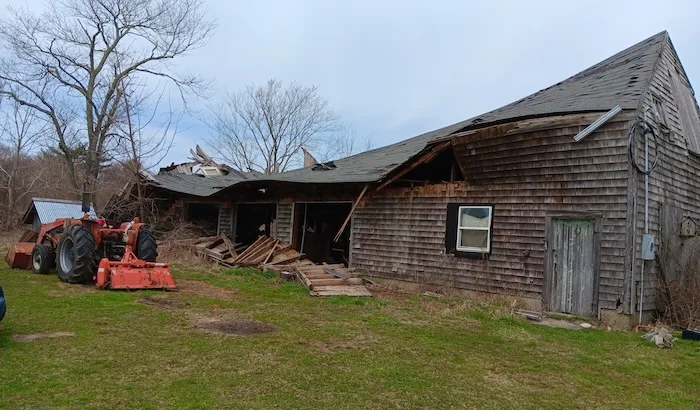
Dartmouth dispute underscores challenges faced by small-farm cooperatives
In more than five years of reviewing applicants, the Massachusetts Cannabis Control Commission has only issued a total of four provisional licenses for Craft Marijuana Cooperatives. Defined by the CCC as a “type of Marijuana Cultivator that allows growers to join together and grow up to 100,000 square feet of marijuana plants among them,” no such operations have been authorized to drop seeds in the Bay State.
Claudia Arsenio has been in a fight to obtain one such craft coop license for years. She already faces all the obstacles that any small biz endures in this industry, but on top of those restrictions, before she can officially approach the CCC, Arsenio must first clear a seemingly insurmountable hurdle—elected officials and bureaucrats from the Town of Dartmouth, where her farm is located.
Like with other license types, applicants seeking to open a craft coop need to secure a Host Community Agreement or a waiver of said document from their municipality. But it is hard to obtain that permission when, as is the case with Dartmouth and Arsenio, your town is suing you specifically to block your cannabis business.
“At the end of the day, the people in charge of the Host Community Agreement are the Select Board, the planning department, and the building inspector,” Arsenio said. “So it feels like a very defeated kind of use of my resources to try and continue fighting this in superior court. Are they ever going to give me a Host Community Agreement so that I can then go to the CCC and get a license?”
In an interview with Talking Joints Memo, Arsenio explained that part of the problem stems from the property she hopes to turn into a weed farm being located 0.7 miles outside of Dartmouth’s Marijuana Establishments Overlay District.
“The farm is 22 acres, but 16 of those acres are wetlands, which creates some pretty challenging soil conditions on the property,” she said. “It remains pretty wet most of the spring, most of the [cannabis growing] season, making it difficult.”
As part of her plan to improve the property, she pitched the idea of replacing her deteriorating barn with an indoor cultivation facility.
“There is an Agricultural Preservation Restriction (APR) that is placed on my property,” Arsenio said. “I am given rights to construct buildings within existing infrastructural envelopes.” In short, she can only rebuild where structures, no matter how dilapidated, are already in place.
Despite receiving a variance from the town’s Zoning Board of Appeals to construct a cannabis facility less than one mile outside of the overlay district, the town’s Select Board rejected the proposal and sued Arsenio in Bristol Superior Court.
At the New England Cannabis Convention in Boston last month, the applicant approached CCC Commissioner and Acting Chair Ava Callender Concepcion during a question and answer session after a panel. “I think there’s a bigger issue here,” Concepcion said. “Towns do have a good level of discretion. There’s not a lot that the CCC can do about that.”
The state’s craft coop license allows up to six small farms to join forces to grow, process, and wholesale cannabis—as long as the combined canopy remains less than 100,000 square feet. The designation was initially presented as a way for small farms to get into the market, and has technically been available for applicants for at least five years. As of March 7, only four provisional licenses have been issued, with two more applications pending. Not a single one has opened up for business.
Last summer, CCC members discussed adjusting some of the requirements for the coop license class in response to the clear lack of candidates. In the time since, commissioners have noted the unlocked potential of the category, but prioritized other issues like changes to Host Community Agreements and to delivery license requirements.
On the other side of the table, attorneys for Dartmouth are arguing that its own Zoning Board of Appeals only has the authority to grant variances that apply to zoning bylaws. In Arsenio’s case, the body granted relief relevant to the preservation restriction.
“The Decision exceeds the authority of the Defendant ZBA, failing to satisfy any of the statutory standards for the issuance of a variance, any one of which failures independently would be fatal to the validity of the Decision,” per the complaint.
Under the strain of attempting to open a craft cannabis coop, Arsenio said her personal relationships have deteriorated. Town representatives are unmoved by that or any other hardships; the complaint reads, “Most people do not utilize their land for income-generating purposes, and Defendant Arsenio is not required to farm the [property] in order to continue to live on it.”
Dartmouth restricts cannabis operations from opening within 500 feet of a residence. Arsenio’s own home is within that boundary, so she actually agreed to move out of the house in order to obtain local approval. But despite the offer to relocate her personal domicile, Arsenio is still waiting for her day in court. She expects to have to represent herself as a result of how much money she’s already lost from the roadblocked venture, but she isn’t giving up just yet.
“I understand that I may not be able to ever grow cannabis on this property,” Arsenio said. “But I’m going to continue to advocate for farmers’ rights in the industry. It really is an important thing to advocate for, as we continue to struggle to provide our community with the food and the support that it needs.”

























